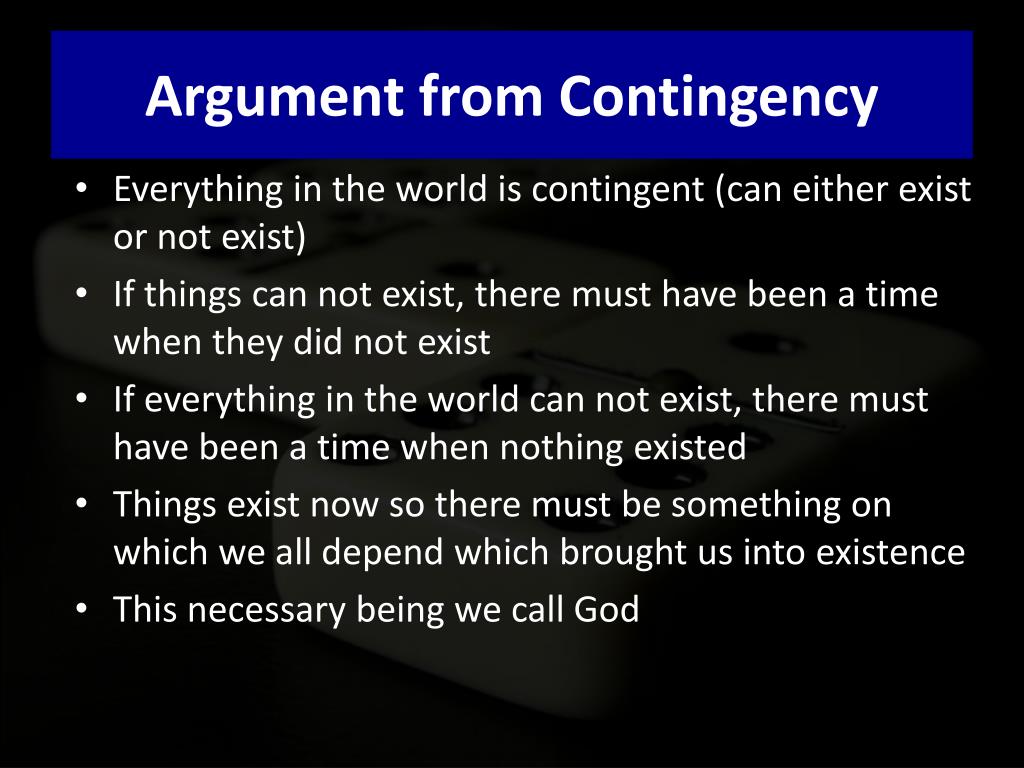Aquinas cosmological argument for the existence of god

Islamic philosophy enriches the tradition, developing two types of arguments.
Post navigation
The Arabic philosophers falasifa developed the atemporal argument from contingency, which is taken up by Thomas Aquinas —74 in his Summa Theologica I,q. The world is composed of temporal phenomena preceded by other temporally ordered phenomena. Since such a series of temporal phenomena cannot continue to infinity, the world must have had a beginning and a cause of its existence, namely, God Craigpart 1. During the Enlightenment, writers such as Georg Wilhelm Leibniz and Samuel Clarke reaffirmed the cosmological argument. The principle of sufficient reason is likewise click here by Samuel Clark in his cosmological argument Rowechap. We could admit an infinite regress of causes if we had evidence for such, but lacking such evidence, God must exist as the non-dependent cause.
Recent Posts
Many of the objections to the argument contend that God is an inappropriate cause because of God's nature. For example, since God is immobile and has no body, he cannot properly be said to cause anything.

The cosmological argument came under serious assault in the 18th century, first by David Hume and then by Immanuel Kant. Hume attacks both the view of causation presupposed in the argument that causation is an objective, productive, necessary relation experienced as power that holds between two things and the Causal Principle—every contingent being has a cause of its being—that lies at the heart of the argument.

Kant contends that the cosmological argument, in identifying the necessary being, relies on aquinas cosmological argument for the existence of god ontological argument, which in turn is suspect. We will return to these criticisms below. Both theists and nontheists in the last part of the 20th century and the first past of the 21st century generally have shown a healthy skepticism about the argument. Alvin Plantingachap. However, Gale seems to have changed his mind and in recent writings proposed his own version of the cosmological argument that leads to a finite God, which we will consider below. Similarly, Michael Martinchap. Yet dissenting voices can be heard. It is very unlikely that a universe would exist uncaused, but rather more likely that God would exist uncaused. In short, contemporary philosophers continue to contribute increasingly detailed and complex arguments on both sides of the debate.
Typology of Cosmological Arguments Craig distinguishes three types of cosmological arguments.

The first, advocated by Aquinas, is based on the impossibility of an essentially ordered infinite regress. Another way of distinguishing between versions of the argument is in terms of the relevance of time. In Aquinas's version, consideration of the essential ordering of the causes or reasons proceeds independent of temporal concerns.
Navigation menu
The relationship between cause and effect is treated as real but not temporal, so that the first cause is not a first cause in time but a sustaining cause. The distinction between these types of argument is important because the objections raised against one version may be irrelevant to the other versions. Argument for a First Sustaining Cause Thomas Aquinas held that among the things whose existence needs explanation are contingent beings that depend for their existence upon other beings. Richard Taylor99— discusses the argument in terms of the universe meaning everything that ever existed being contingent and thus needing explanation. Or, why is there anything at all? Smart, in Haldane and Smart, 35; Rundle. The response of the cosmological argument is that what is contingent exists because of the action of a necessary being.
We might sketch out the argument as follows. A contingent being a being such here if it exists hesi case study copd with pneumonia could have not-existed or could cease to exists. This contingent being has a cause of or explanation[ 1 ] for its existence. The cause of or explanation for its existence is something other than the contingent being itself.
What causes or explains the existence of this contingent being must either be solely other contingent beings or include a non-contingent necessary being.

Contingent beings alone cannot provide an adequate causal account or explanation for the existence of a contingent being. Therefore, what causes or explains the existence of this contingent being must include a non-contingent necessary being.]
Aquinas cosmological argument for the existence of god - useful
Toward Authoritarianism Cosmological Argument Also known as argument from universal causation and argument from first cause, with three varying but related approaches. The key element of the argument centers around causality and ends with a conclusion of a first cause — or unmoved mover s or prime mover s — which equate to a God or gods that were the initial cause, or mover or force that created our existence and universe. The Argument from First Cause not only establishes, philosophically and rationally, the existence of a God or gods, but sets the foundation for all right reasoned first principles. Other arguments that add to the philosophical proof for the existence of a God or gods include teleological argument -aslo know as argument from design — and argument from reason. Cartesian Dualism The philosopher Rene Descartes expanded upon concepts of dualism first articulated by Plato and Aristotle. He reasoned that the body could be divided up by removing a leg or arm, but the mind or soul were indivisible. Thomas Aquinas summarized his cosmological argument in the Summa Theologia. In this theological masterpiece, St. aquinas cosmological argument for the existence of god.Aquinas cosmological argument for the existence of god Video
The Best Argument for The Existence of God W/ Trent HornAquinas cosmological argument for the existence of god - apologise
Europeans polled who "believe in a god", according to Eurobarometer in North Americans polled about religious identity Positions on the existence of God can be divided along numerous axes, producing a variety of orthogonal classifications. Theism and atheism are positions of belief or lack of it , while gnosticism and agnosticism are positions of knowledge or the lack of it. Ignosticism concerns belief about God's conceptual coherence. Apatheism concerns belief about the practical importance of whether God exists. For the purposes of discussion, Richard Dawkins described seven "milestones" on his spectrum of theistic probability : [2] Strong theist. In the words of C. Jung : "I do not believe, I know. Very low probability, but short of zero. Classical theists do not believe that God can be completely defined. They believe it would contradict the transcendent nature of God for mere humans to define him.

Category
Best Posts
- Effect of Temperature on the Rate of
- team work effectiveness
- Foua Yang Reflection
- saving private ryan analysis essay
- Dulce Et Decorum Poem Analysis
- libertarianism definition philosophy
- Slovakia Essays
- where did spanking come from
- Inequality In The Bean Trees And Hard
- walter kerr theatre map
- Carl Brashear And Benjamin Oliver Davis: Character Analysis
- shining shakarr






 1092
1092